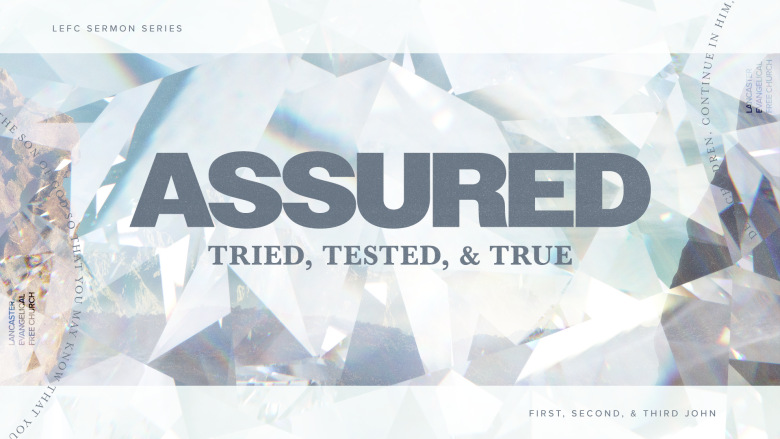Assured
We proclaim who we know
CLICK HERE FOR THE LIFE GROUP DISCUSSION GUIDE CONTAINING DISCUSSION QUESTIONS
The epistles of John:
- Written around 85-100 A.D. by John and likely from Ephesus.
- They are pastorally written in care for the church as compared to the Gospel of John which is to proclaim Jesus to those who do not know Him.
- Cause- Concern for false teaching harming the church and hindering the gospel work.
- Initial motives of new heresy were likely the result of explaining the gospel in new cultural contexts. Simple correction needed.
- Heresies that were of most concern were those being led by people who were commanding loyalty to their teaching and were not willing to come under authority of the apostles. They devalued a commitment to the Spirit.
- Most of these heresies were a devaluing of who Christ is and what His work accomplished. EBC
- Jesus is the Son of God. Are you sure?
- Jesus came in flesh. Are you sure?
- Jesus has authority in heaven and on earth. Are you sure?
- We are fully depraved with a sinful nature—incapable of saving self. Are you sure?
- We are to love people, all people, even enemies as Jesus did. Are you sure?
- Jesus’ standard of righteousness is to be our standard. Are you sure?
- We are called to live as Jesus lived. Are you sure?
- Living Jesus’ way requires fellowship with Him and the church. Are you sure?
- This letter is to keep the church on the correct track that leads to true life in Christ and revival of the church.
- It was to provide an assurance of the true church—Tested, tried, and true.
Pray
Read 1 John 1:1-4
Verses 1-3a are all one sentence. When you break up a sentence into three verses you can lose the main point, especially when the main verb is in verse 3—“We proclaim…” NIV and several other translations make sure that the beginning of the sentence (verse 1) is not read without knowing the primary action.
“We proclaim” ἀπαγγέλλω occurs in verse two and verse three. Primary emphasis is on the latter one in verse three.
Before addressing the heresies arising from within the church John emphasizes the message that the church is to proclaim—the Word of Life.
Our message—the Word of Life!
- It is our message. Our content. Our hope. The good news. The Word that gives life.
- Life that affects the now and affects eternity.
- Jesus is that Word of Life we proclaim. (2)
- Read John 1:1-5 Compare to verse 1 John 1:1-2
- “Jesus is both the preacher of God’s message and the message itself.” Howard Marshall
True fellowship requires participation with someone.
- Fellowship (koinonia)- participation with or union with another (nurtured relationship).
- Seeing- They had walked with Jesus for three years and saw how he lived and responded to what life
- Hearing- They heard His teaching and then could engage Him further to seek clarification and understanding. They could align His words with His life.
- Touching- They got to experience the human/physical side of Jesus. The hugs, the nudges, the greetings, and meals. They saw him tired. They saw him zealous. They saw him weep. They saw him celebrate. He was fully human.
- Seeing, Hearing, Touching—they knew he was truly and fully the Son of God.
- They knew Him because they had fellowship with him—they participated directly with Jesus.
- To trust the teaching of someone who has no fellowship with the one they teach would be foolish.
By having fellowship with those who experienced and proclaim Jesus, we can be guided to the path of fellowship with Jesus.
- Me: Pastor Berry, Gary Hunt. My mom and my dad. John at SBU. Pastor Dave. J
- You: Corey Mitchell, Greg Heisey, Chris Cox, Julie Belsterling, Linsey Snader.
- You have heard them, seen them, and been near them. You know they love Jesus and teach with integrity their experience and knowledge about Jesus.
We can proclaim what we know. We proclaim better who we know!
- The great commission is a relational movement built on a relational strategy from the original design of mankind.
- Matthew 28:19-20
- Genesis 1:26-27 (image); 2:7 (given breath of life); John 17:3 “life is found in knowing Jesus.”
- John proclaims to us what he has seen, heard, and participated in.
- We proclaim what we have seen, heard, and participated in.
Questions to consider:
- Do you know Jesus? Have you experienced the Word of life? Introduce Romans 10:9-10
- Do you have true fellowship with Him? (participating with Him, a nurtured relationship). Your testimony, your story. Your seeing, hearing, and your direct experience. What makes your story valid?
- Are you proclaiming Jesus? (That is what He would do. It is what He has charged us to do.) Oikos- fellowship that connects. They know you. You know Jesus. Make the connection!
Series Information

The Apostle John writes these letters to the church from a shepherd’s heart caring the sheep. Many trials will come to test us and discrouge us and even cause confusion. The letters of John are to give us assurance that Christ is sufficient and that we can stand there. This will give us confidence to stand in the truth in the face of testing and trials.
